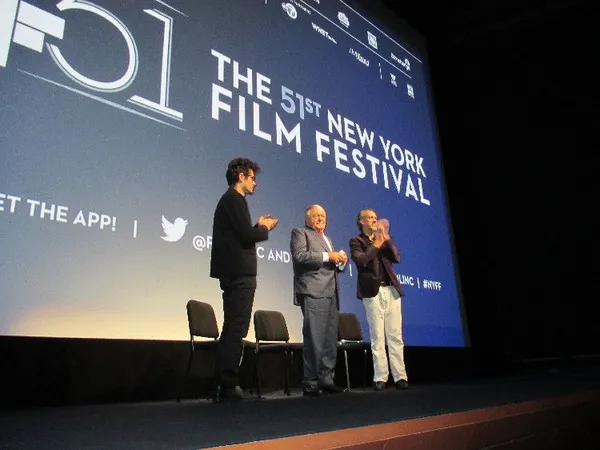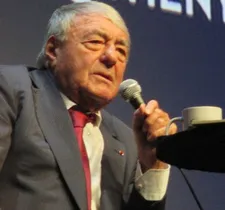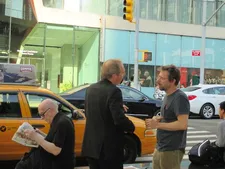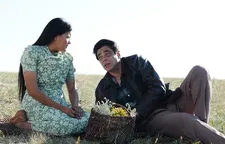 |
| Claude Lanzmann with Kent Jones on The Last of the Unjust: "The general tone of Shoah was epic. This is not epic." Photo: Anne-Katrin Titze |
In part two of our conversation, Kent Jones and I continue with questions of memory and justice and discuss the connective tissue of World War II in Jimmy P: Psychotherapy Of A Plains Indian with Claude Lanzmann's The Last of the Unjust and Shoah, Stanley Kubrick's unfinished Aryan Papers, Kristina Söderbaum, Thomas and Veit Harlan and the positioning of Steven Spielberg's Schindler's List.
In part one we discussed the loops to Paul Thomas Anderson's The Master, the place of the American landscape, why Sam Shepard's mystical west is radically different from what is shown in Arnaud Desplechin's Jimmy P. and how the relationship of cinema and psychoanalysis falls flat - from Alfred Hitchcock to Robert Bresson and François Truffaut.
In Jimmy P: Psychotherapy Of A Plains Indian, based on the case study Reality And Dream by ethnologist and psychoanalyst Georges Devereux, nationalities and accents blur to bring light, while Devereux (Mathieu Amalric in fire and fervor) and his patient Jimmy Picard, a Native American World War II veteran played with internal radiance by Benicio Del Toro, embark on mapping out disclosures of the mind.
 |
| Mathieu Amalric as George Devereux in Jimmy P: Psychotherapy Of A Plains Indian |
Anne-Katrin Titze: When I told you that I moderated a panel discussion on Generation War, you said you hadn't seen it. In Germany there is a kind of double silence. The private and the public stories and non-stories don't match up. Which explains partly why a TV series, controversial as it is, can make such waves in 2013. Last chance to speak about experiences during the war. Last chance to ask parents, grandparents or great grandparents.
Kent Jones: Claude Lanzmann in his autobiography said when he went to teach in Germany right after the war the whole university was just teeming with former Nazis. The government was honeycombed with former Nazis as well… Thomas Harlan [son of Nazi film director Veit Harlan], when you look at his interview with him in Wandersplitter (2007) speaks of his father's guilt. "I loved my father madly," he said, "I could not just let him off the hook." On his deathbed he [Veit Harlan] finally said a little something. He made an overture towards asking for forgiveness and redemption. Unfortunately, Germany just never really availed itself of the opportunity.
AKT: That would be an interesting film series - "Off The Hook" movies. How do you see the role of Schindler's List, for example?
KJ: Schindler's List is an interesting case. Kubrick wanted to make a film about movie making during the Nazi period. So he consulted with Kristina Söderbaum and he did a lot of research but he finally decided there was no real way of doing it. Then, as you probably know, he bought the rights to Wartime Lies by Louis Begley and planned a film called Aryan Papers and went very, very far down the road with the movie. When Schindler's List came out, he said, well, nobody is going to see the film now. Which is really a shame. He shot tests. There was this exhibition that was done [at LACMA, the Los Angeles County Museum of Art in 2013]. What he wanted was to find a story that would contain all of the horror of Nazi Germany in the images and in the trajectory of one person, so that you can feel the horror and the danger in every situation, in every moment in every room. If you look at the stills, you can really feel what he was trying to do. That's the film that no one ever made, I must say. Schindler's List really is not that film.
AKT: Is there anyone attempting to resurrect the project?
 |
| Claude Lanzmann at the New York Film Festival: "The trick was, I needed quite a lot of courage in one way to be myself in the film." Photo: Anne-Katrin Titze |
KJ: Who could do it? You need Kubrick. There's a book by Frederic Raphael, the guy who co-wrote the script for Eyes Wide Shut (1999) [Eyes Wide Open: A Memoir of Stanley Kubrick] and they are talking about the Holocaust. Raphael [brings up] Schindler's List and Kubrick says "Really? Do you think that's really a film about the Holocaust? I would call it a success story. Because the Holocaust is about six million people who died and Schindler's List is about one thousand people who lived." That kind of says it all.
AKT: The image of Claude Lanzmann standing in the crematorium in Theresienstadt in the present time in The Last Of The Unjust is all the visual I need. His hands touching the metal of the cart.
KJ: Yes. Shoah as well. When Filip Müller is talking about the first time he enters the crematorium and he sees piles of bodies and strange blue crystals. He said, "I couldn't make sense of it. I had no idea what I was seeing." It is extremely vivid.
AKT: The actual locations and objects contain a memory and language summons up images. The re-staging of events always does something else.
KJ: When Schindler's List (1993) came out, the scene that bothered me was the scene where the women are all stripped down and go into what they think is the gas chamber but then turns out to be the shower. My understanding was that people didn't know about the gas chambers and so if they were herded into a room they wouldn't think they were about to be gassed because no one survived to spread the rumour about it.
 |
| Mathieu Amalric to Arnaud Desplechin: "I don't want to be Devereux, I want to be your Devereux." Photo: Anne-Katrin Titze |
AKT: Then you have Theresienstadt Elder Benjamin Murmelstein in The Last Of The Unjust talk about it - that there was a certain knowledge.
KJ: Okay, are there faults with Schindler's List? Yes. But then, okay, he made the film. It's what it is. It's not to be condemned or enshrined. It's just a movie.
AKT: It has become enshrined, though.
KJ: Schindler's List?
AKT: Yes. It has become the reference point, as the Holocaust movie.
KJ: In terms of the perpetuation of memory, that's the sticky point. History is a matter of remembering and forgetting.
AKT: Precisely. I just saw a documentary called Sewing Hope on Sister Rosemary's commitment to help severely victimised women in Uganda. I spoke to her when she was in New York and her work in rebuilding these women's lives is of the highest importance. Their story has to be told, I don't really care in which way. You mentioned the importance Claude Lanzmann's work has for Arnaud Desplechin.
KJ: Arnaud saw Shoah when it opened and said to himself 'here's the film that we've all been waiting for'. I can't wait to read the papers tomorrow and read all the wonderful things from the film critics who have been waiting along with me for this film'. The next day came and there were none. Arnaud became passionately involved in keeping the idea of Shoah as a great film alive. He's been a very good friend of Claude's over the years. The idea of being Jewish in France, in Europe has really haunted his work. He was raised as a Catholic.
 |
| Misty Upham as Jane with Benicio Del Toro as Jimmy P |
In Jimmy P. the hospital is honeycombed with Jewish doctors. The idea of memory and justice haunts his films very much. Being bereft and just. At the end of Kings And Queen when Mathieu [Amalric] is talking to the boy and he says to him in a very direct way: 'Look, I'm not going to adopt you and we're not going to be friends. And here's why. Because I'm an adult. You're a child."
The link to what we've just been talking about is in the personality of Arnaud and his sense of being direct and just, when it's needed. Like Claude [Lanzmann]. Claude has that kind of thinking. He said, you can never master the Holocaust. No matter how close you get, you'll find that there's a whole other universe that's unexplored. It's a matter of devoting yourself to the idea of justice, whether it's on a personal scale or whatever undertaking you choose. I feel it very powerfully in Arnaud's presence and also in his work.
AKT: Are you going to the César award ceremony?
KJ: I'm not sure. I count on Arnaud to say the right thing… He's already made another movie.
AKT: He mentioned something for TV [when I spoke with him at last year's New York Film Festival].
KJ: He is mixing it now. And then he's written another script he'll shoot in the summer.
AKT: In France?
KJ: Yes.
AKT: You are not involved in this one?
KJ: No. But I read it. It's great.
AKT: I suppose you can't say anything more at this point?
KJ: No.





















